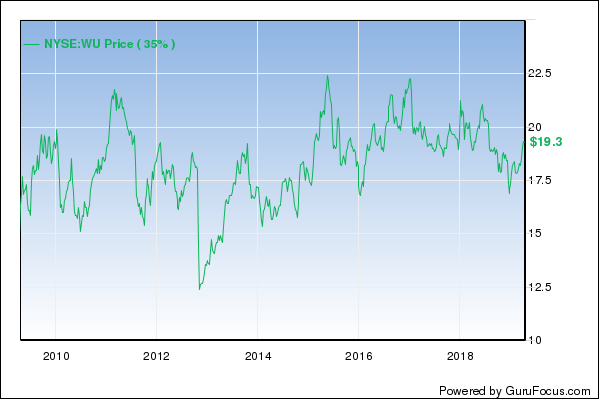Don't Expect a Turnaround at Western Union Yet
- By Jonathan Poland
Western Union (WU) is the largest money transfer company in the world with roughly 500,000 agents, dwarfing its next closest competitor, MoneyGram (MGI), in sales and market capitalization. Of course, business has not been the same since the rise of cryptocurrency.
In the last decade, the company generated over $7 billion in net income, yet in the last 24 months, profits have turned negative, with the last December periods in the red. In the last year, insiders have done nothing but sell. In fact, five different executives have sold between $40,000 and $1.6 million worth of Western Union stock. Even former guru owners Ken Fisher (Trades, Portfolio) and Joel Greenblatt (Trades, Portfolio) have sold out of their entire position in Western Union.
Warning! GuruFocus has detected 3 Warning Signs with WU. Click here to check it out.
The intrinsic value of WU

Despite the company's declining fundamentals, its stock has been trading in a pretty tight range. Long term, under stable economic conditions, Western Union could see its profits reach over $1 billion annually, but current volatility is a big adjustment that the firm needs to deal with correctly. It's tried to boost shareholder value with buybacks, but now its operating cash flow is 67% of what it was just a decade ago, and the company's book value has turned negative. Business conditions are favorable in the U.S. and Western Europe, yet there seems to be persistent weakness across Asia and the Middle East.
Future growth is possible
Western Union is doing what it can to get the growth engine started again. First, it's looking to sell its business-payments unit, which could be worth $500 million. The unit caused Western Union to take a $464 million impairment after last year's changes in the U.S. tax code. The company is also expanding its digital services as it tries to keep pace with competitors. Earlier this month, it signed a deal with Hong Kongs's HKT Payment to allow customers to use Tap & Go to send money anywhere in the world. These "digitally-initiated" transfers are Western Union's fastest growing business with 20% annual growth in the last few years.
All this is necessary to survive; however, if cryptocurrency is here to stay, which is still anyone's guess with the recent price declines, then payment intermediaries (like Western Union) become less important. At this point, the dividend yield is all public investors have to look forward to. As a bolt-on acquisition, the operating cash flow could fuel growth for another organization, but with an $8 billion price tag, Western Union's stock remains too expensive for a merger as well.
Don't overpay
Compared to its closest direct competitor, MoneyGram (MGI), Western Union looks rock-solid. The question is: for how long? MoneyGram has generated annual losses in five of the last 10 years, but has at least grown its top line by more than 60%. It has a global network with over 350,000 locations in more than 200 countries, just like Western Union. More importantly, its market capitalization is just $115 million, almost 99% lower for roughly the same service. This along with the ongoing threat from crypto is enough to make paying $8 billion for Western Union laughable. If we're headed to a recession, the stock could get cut in half.
Disclosure: I am not long/short any stock mentioned .
This article first appeared on GuruFocus.
Warning! GuruFocus has detected 3 Warning Signs with WU. Click here to check it out.
The intrinsic value of WU
